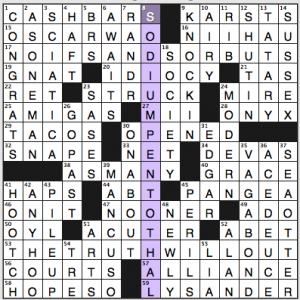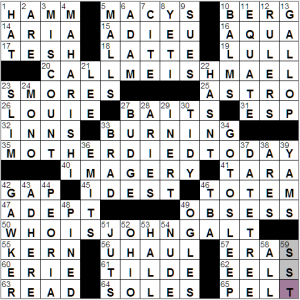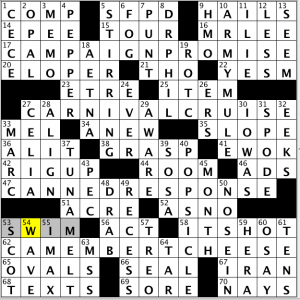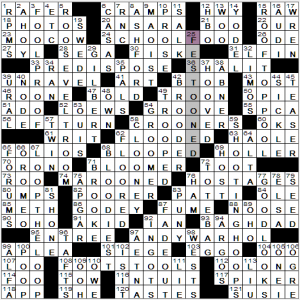NYT 5:29 (Amy)
LAT 5:25 (Gareth)
CS 5:40 (Dave)
CHE 5:22 (pannonica)
WSJ (Friday) 11:58 (pannonica)
David Woolf’s New York Times crossword
Interesting themeless with some unusual fill today:
- 9a. [Rough limestone regions with sinkholes and caverns], KARSTS. This is what’s involved when you hear of those Florida sinkholes. As water tables are depleted, sinkholes sink.
- 15a. [Novel title character with a “brief, wondrous life”], OSCAR WAO. Novel by Junot Díaz.
- 16a. [Hawaii’s Forbidden Isle], NIIHAU. If asked to list all the Hawaiian islands, I’m pretty sure I would forget this one.
- 34a. [Powerful Hindu deities], DEVAS. Legit plural.
- 41a. [Unlucky accidents, old-style], HAPS. Friend of mine is wont to ask, “What are the haps?” to find out what’s happening.
- 53a. [Assertion more likely to be correct if 8-Down is given], THE TRUTH WILL OUT. Part of a mini-theme, sort of, with the following:
- 8d. [What an interrogator might administer], SODIUM PENTOTHAL. Aka truth serum.
- 59a. [Whose eyes Puck squeezes magical juice on], LYSANDER. A Midsummer Night’s Dream.
- 1d. [“Well done!”], CONGRATS. Casual and super-common.
- 3d. [Common result of a slipped disk], SCIATICA. It can also result from the piriformis muscle in the hindquarters clamping down on the sciatic nerve.
- 9d. [Bring home, as a run], KNOCK IN. I tried DRIVE IN first. Nearby SHUT IN dupes the IN but both answers are solid and we can look past this.
- 13d. [Vast historical region controlled by the Mongols], TATARY. I know of the Tatars and I have a doctor named Tatar, but I had not encountered Tatary before.
- 30d. [Speaking of repeatedly, to a Brit], ON ABOUT. Perhaps awkwardly clued, yes? “What are you going on about?” The “going” can be omitted.
- 36d. [Good hand holding in Omaha Hi-Lo], ACE DEUCE. This is … poker?
- 39d. [Alpine skier Julia who won Olympic gold in 2006], MANCUSO. It was just this evening that I first heard of her, from Tony Orbach! He was submitting a Daily Celebrity Crossword theme about skiers so I was just reading up on her not three hours ago. So this afternoon, I would have decried this answer as woefully obscure but now I know it. (For the record, she’s on the US Ski Team’s “A Team” and stands a good chance of representing the country in the Sochi Olympics.)
- 41d. [Still-produced stuff], HOOTCH. Prefer the “hooch” spelling.
- 42d. [Slangy segue], ANYHOO. Cute!
- 43d. [Awful accident], PILEUP. You can also have pileups of bad crossword fill, but not in this puzzle.
I also liked seeing CASH BARS, VAGABOND, and PANGEA. This 68-worder marks an auspicious debut by a constructor whose sister announced the news of his puzzle on Twitter and she appears to be a delightful writer whom five of my tweeps are following in Twitter. Between Rebecca’s book and David’s puzzle, the Woolf family can be justly proud.
4.25 stars. Fresh puzzle filled with a lot of stuff that doesn’t populate our crosswords all the time, yet is not woefully obscure either. Keep making themelesses, sir!
Peter A. Collins’ Chronicle of Higher Education crossword, “In the Beginning” — pannonica’s write-up
The right-in-the-CHE-wheelhouse theme here is deceptively simple: the starts of famous novels. But when you think of it, how many novels with recognizable and memorable beginnings that are complete sentences less than 15 letters long? The options shrink dramatically.
- 20a. [” ___. Some years ago—never mind how long precisely— …”] CALL ME ISHMAEL. Moby-Dick (Herman Melville, 1851). Maybe.
- 35a. [“___. Or maybe yesterday.” L’Étranger (Albert Camus, 1942). MOTHER DIED TODAY. It’s my understanding that an accurate English translation of the original’s Maman is elusive.
- 50a. [“___? The light was ebbing, and Eddie Willers could not distinguish the bum’s face.” WHO IS JOHN GALT? Atlas Shrugged (Ayn Rand, 1957). Holding my nose as I type this entry.
I suspect the chronological order of the source material is coincidental, but it may have been intentional, since the spanning entry is conveniently the middle one in age.
Had many misfills, and a couple were pleasant surprises because my original thoughts for some were, “weak entry” or “bad clue.” only to be revised when I found the correct answer: 10a [Polar hazard] BERG (not BEAR), 61a [El Niño wave?] TILDE (not TIDAL). Others: 1a [Soccer star who wrote “Go for the Goal] Mia HAMM, not PELÉ; 37d [Oasis sight] DATE TREE, not DATE PALM; 53d [Campus building] HALL, not QUAD.
Long non-theme entries are strong, and stacked to boot. MISCOUNT and MAHARISHI, GO TO SLEEP and DATE TREE. The center nodule has sizable acrosses of 5 and 7 letters clamped to either side of that 15-letter spanner.
Finally, what boosts this puzzle solidly to the above-average bracket is the abundance of great clues. My favorites include:
- 3d [Get a wrong number] MISCOUNT.
- 18a [Tall order, maybe] LATTE.
- The aforementioned TILDE.
- 32a [Stops in the country] INNS.
- 64a [Top Sider’s bottoms?] SOLES, appropriately in the bottom row.
The End.
Gail Grabowski’s CrosSynergy / Washington Post crossword, “Open-and-Shut Case” – Dave Sullivan’s review
Four theme entries that begin with CA and end with SE:
- [Politician’s pledge] clued CAMPAIGN PROMISE – it’s funny to me how voters still believe that these promises may actually be kept if the politician is elected.
- [Pleasure voyage choice, perhaps] was CARNIVAL CRUISE – odd to me in the singular or without LINE(S) at the end.
- [Predetermined reply to a common question] clued CANNED RESPONSE – I’m trying to come up with an example of this–I don’t think it’s the same as a rhetorical question (which the asker already knows the answer of), but perhaps they are the same. I think of “canned laughter” as the laugh track to comedy shows–is that the same kind of can here? (Obviously these are questions I don’t have the answer to already!)
- [Dairy product with a rind] was CAMEMBERT CHEESE – the “cheese” here is superfluous–it’s just “camembert,” named for the Normandy town where it was first made.
The chosen phrases aren’t as solid as I’d like, but I did enjoy some of the fill such as the proximity of ROTC to ARMY MULE and the consonant-rich DR. PHIL. The [Frozen sweet on a stick] or POPSICLE reminded me of the fudge variety we enjoyed as kids. AS NO is an awkward partial, so I’ll award that my UNFAVE today.
Jerry Edelstein’s Los Angeles Times crossword—Gareth’s review
A different style of phrase altering than usual occurs in today’s puzzle by Jerry Edelstein. Instead of the letter “L”, an “L” sound is added. It’s especially consistent that that sound is added in every case at the end of the last word and that each word has one-syllable and a long-I sound. The answers themselves didn’t really hit my wacky-bone, except for NEVERSAYDIAL, but are perfectly serviceable. To list, we have:
- 16a, [Porky’s jacket and tie?], PIGSTYLE
- 27a, [Prohibition at the Ivory soap factory?], NEVERSAYDIAL
- 44a, [Pre-law classroom exercise?], COLLEGETRIAL. I’ve never heard the base phrase before in my life, but I assume it’s common enough American-ese.
- 60a, [Bad place to be shipwrecked?], EVILISLE
Outside of the grid, this puzzle felt ultra-conservative, especially for a puzzle with 40 theme squares. It’s a 41/78. MIRAMAX was a zippy answer, MESSI is current and the clue of EVER, [“Oh, when will they __ learn?”: Seeger lyric] evokes a classic song. Otherwise not much good or bad to report back to you.
3 Stars. Gareth
Randolph Ross’ Wall Street Journal crossword, “Oo Baby!” — pannonica’s write-up
Simple in concept, tricky in construction, impressive in completion. The grid’s fill is positively laden, FESTOONED (25d) if you will, with double-Os. The literal centerpiece is the gash of them running northeast/southwest in the large middle bloc of the grid. Or rather than a possibly violent gash it can be better compared to, ah, a serving of beef wellington, or—oh! most appealing of all—expertly seared tuna, with that nice raw red center. Can you tell I haven’t had lunch yet?
In addition, words with double-Os abound in the perimeter, both in long fill with two instances of doubling as well as in shorter fill. We’re talking SCHOOL FOOD, ROOFTOP POOL, FOOLPROOF, FOOTSTOOLS, SHOOTING HOOPS, ROOSEVELT ROOM. We’re talking an assortment of ROO, LOO, FOO, OOH, ROONE, NOOSE, BOO, and more. We’re talking OOLONG TEA and [Milk maker, to toddlers] which I thought was going to be naughtier than MOO-COW.
Yet despite the OO saturation, there’s room for PREDISPOSE, ANDY WARHOL, UNRAVEL, BAGHDAD, and other interesting midlength fill.
The only two sour notes I experienced were the lone triple-O of 104a [Win in a simple game] and the unsavory, unpopular variant at 37d [Like reindeer] HOOVED.
Very fun crossword.






Never encountered this spelling of Pangaea before, without the extra “a”.
In Omaha Hi-Lo, every player is given four cards. You have to only use two of them. The player with the best hand gets half the pot and the player with the lowest hand gets the other half (you can be both). A2345 is the best low hand, and with A2 in your hand you are likely to have the low part of the pot, unless you get a board (the part of the hand everyone shares face up on the table) like A2578. Then you’d want a 3 and a 4.
Bencoe,
For the uninitiated: You must play precisely two cards from your hand. The board has five cards, dealt as in hold’em with an opening flop of three cards, a fourth card called the turn and a fifth card called the river, What makes Omaha diabolical is that there must be at least three unpaired cards 8 or lower on the board or there is no low.
Let’s say the flop is 4-5-K and you are dealt A-2-3-6. You cannot lose low (called “uncounterfeitable”), but if the turn is a 9 and the river a 10, there is no low.
You also always have to worry about being “quartered” with a nut low like A-2 as it is an automatic must play combo and what frequently happens is that the high gets half and the two A-2 combos each get half the low or a quarter of the whole pot.
I play in a heavy duty $8-$16 game at Casino Arizona. It is considered by many to be the best game in the Casino because it is a heavy action game that frequently results in pots in excess of $300 and sometimes as high as $800+. It is hard to beat the house rake in general, but the pots in this game are so huge, that you can overcome the rake if you are lucky on that day.
“Rivered” is a wonderful verb in both Hold’em and Omaha.
Steve
Yeah, and the rake can really kill you in Hi-Lo, as the pot can be split between so many people, all with the nut hands for the high or the low, all trying to make sure they max out the pot.
Hard for me. I did not know KARSTS, NIIHAU or OSCARWAO, but I did know ACE DEUCE as I have played Omaha Hi Lo for years.
Did anyone else misspell PENTOTHAL? I put two O’s in. Took me a while to unravel that.
Steve
I’m so much in your boat that I can call you skipper. Except I put two A’s.
I had one A and one O, but not in the right places.
Well, that pretty much takes care of the permutations.
Me too.
Good one. NIIHAU was completely new to me.
Yeah, NIIHAU, KARSTS and TATARY were all Greek to me!
What could have been a great puzzle brought down to good/fair by the NE corner. Normal Friday time until I was left with karsts and Niihau and that was the end of me with Tatary as a down. I actually said Natick out loud which drew some looks.
If it makes anyone feel any better, just two years ago I was in Hawaii and looked at NIIHAU through binoculars from one of those observation spots with a plaque saying something like “There’s Niihau” – and I still labored up there solving that corner. enjoyed it though! And thank goodness for the above-referenced MANCUSO studies I did yesterday! Nice job, David.
I used to go out with a girl who was ethnic Chinese from Malaysia. She had to wait for her younger brothers to be educated before she could go to college. I do not remember if her Chinese was Mandarin, Cantonese, or some hybrid. If I was being a good boy, she would say “Nee How” which I think means “you are good.” If I was behaving poorly, she would say “Nee Poo How.”
I have frequently noticed that Hawaiian names have a counterpart in Chinese. I believe “wainei” is Chinese for “I love you.”
Steve
I thought the same thing about the island’s name–“Ni Hao” is the standard greeting in Mandarin, used as “hello”, although the literal meaning is “you good”.
I looked up information on NIIHAU but could not find the etymological derivation of its name; seems like quite a coincidence.
I don’t have OED access at the moment, so there may have been a semantic shift somewhere in the history of the language, but I’m thinking 41-Across is misclued. HAPS are *lucky* accidents, aren’t they? That’s why someone who is unlucky is “hapless,” and why the King in Hamlet says “Howe’er my haps, my joys were ne’er begun.”
The clue to HAPS is – no doubt intentionally – misdirecting. Hap, old-style, much more often denotes lucky than unlucky in its usage. Otherwise, we would, perhaps, envy all those who were hapless.
I don’t understand how it’s misleading so much as flat-out wrong.
No, not flat-out wrong, but unhappily near. One of the definitions in Johnson’s Dictionary, the last, for the word is “misfortune”.
Citation:
Nor feared she among the bands to stray
Of armed men;
For often had she seen
The tragick end of many a bloody fray:
Her life had full of haps and hazards been.
-Fairfax
NYT: I didn’t know I didn’t know how to spell PENTOTHAL. The NE corner was chock-full of unfamiliar, but most of it worthy. I frowned at ACUTER, but I’ve made different/equivalent compromises in recent constructions, so I get it. I loved the long fill and minithematic elements. Impressive debut, I must say.
CHE: Love CHE themes, love Peter Collins puzzles. Win win!
Re LAT 44a — It should be COLLEGETRIAL, as in “Give it the old college try.” I, too, have never heard of Gareth’s “COLLAGEDIAL,” and I’m American…plus, his solve comes up one letter short!
solve is short one letter!
Sorry that was just a typo. I meant to say that I have never heard the phrase “college try” in my life before, which I haven’t.